Naughty or Nice? A Linguistic Walk Down Memory Lane of Christmases Past
When I was a kid, not today or yesterday, though I can still remember it well, Christmas was a lot less commercial than today. Even so, I still have a memory of older people back then, most now long gone, saying: ‘Christmas isn’t like it used to be.’ ‘Sic Vita Est’ as the Latin scholars would say, shrugging their shoulders heavy with wisdom.
In our time, we got games from Santa and usually practical ones such as chemistry sets, which could take a child’s eye out if misused, or electricity sets from which you could make a mini torture kit. In my house, as we got older, my father always had a word-type game under the tree. They didn’t raise much excitement, but they were used a lot once we got bored with the eye-catching ones. Who remembers some of those old ones? I wonder if they are still around today or are there any equivalent games for today’s young wordsmiths? In honour of those simpler times, join us as we have a look and take a little trip down memory lane, too.

Photo via Pexels
An Old Reliable
Scrabble doesn’t need an introduction surely, right? This classic word puzzle must have been on nearly every games shelf at one stage and it is still a big seller. The game is available in 29 languages, in 121 countries throughout the world and has sold 150 million sets to date. Scrabble was so popular in our house that the box eventually broke. We would lose letters over time and more than once there was a new box under the tree on Christmas morning. Scrabble is one game that has moved easily into the digital age, and there are versions for the web, smartphones and tablets. It may not be a natural first choice on a kid’s list but in one form or another it is still going and next year is the 80th year of the game’s life. What’s the word score for ‘anniversary’?

Photo via Wikimedia
Who’s a Word Mastermind?
Word Mastermind was a simple game and one which tested the player’s speed at deduction. It involved letters, coloured pegs, a plastic board and a bit of guesswork. One player would line up a four-letter word at their end of the board, hidden behind a screen. The other player would guess the selection by lining a word in the slots at their side of the board. Alongside the line of slots was a small square with four holes. The code-setter would place pegs in the square beside the guess. A black peg would signify a letter selected was in the right place, so if A were correct in slot three on the line, then there would be a black peg placed in hole three of the square. A white peg would signify a correct letter chosen but in the wrong hole. No pegs would mean all letters were wrong. You had ten chances to get it right and players would compete to see who would guess the other’s word in the least amount of movements up the board. This game seems to be gone off the market, but used versions are still available on auction sites. Maybe the ban on using expletives led to its demise?

Photo via Flickr
Is There an App for That?
Speaking of moving into the digital age, you will find plenty of online games, apps and websites to test the old noggin. A friend of mine does the Times of London crossword daily and recently moved to the online version, which he says is just as easy to do on his phone as it was on paper. I think he means the physical doing of it, as opposed to the ease of working out the clues, though he is a bit of a champion. A quick look on the app store gives you a long list of word games from puzzles, to logic tests and many other ones, which goes to show how word deduction is still as much fun as it ever was for us humans.

Photo via Wikimedia
Weighty Stocking Fillers
The shelves in newsagents still hold a large selection of word puzzle books. There are crossword puzzles, word-find games, brain-teaser books and many others in the weekly or monthly sections. The popularity of these books makes them an ideal stocking filler and working your way through a few word puzzles mightn’t be a bad way to keep the brain active over the Christmas holidays. I was given a book of word puzzle games back in 1979 by a favourite Uncle and I think it helped with my love of such games today. The puzzle books also help in understanding where words come from and how words can work in different settings.
Word games are like puppies, not just for Christmas and it looks like they could still be as popular today as when I was a kid. Humans will always have an interest in challenging themselves and pitting their word skills against each other. Word games help keep the language interest alive and anything that keeps wordplay going can only be good in my mind.
What are the word games you played as a child? Are they still going today? Were you happy to see something like Scrabble on Christmas morning?
